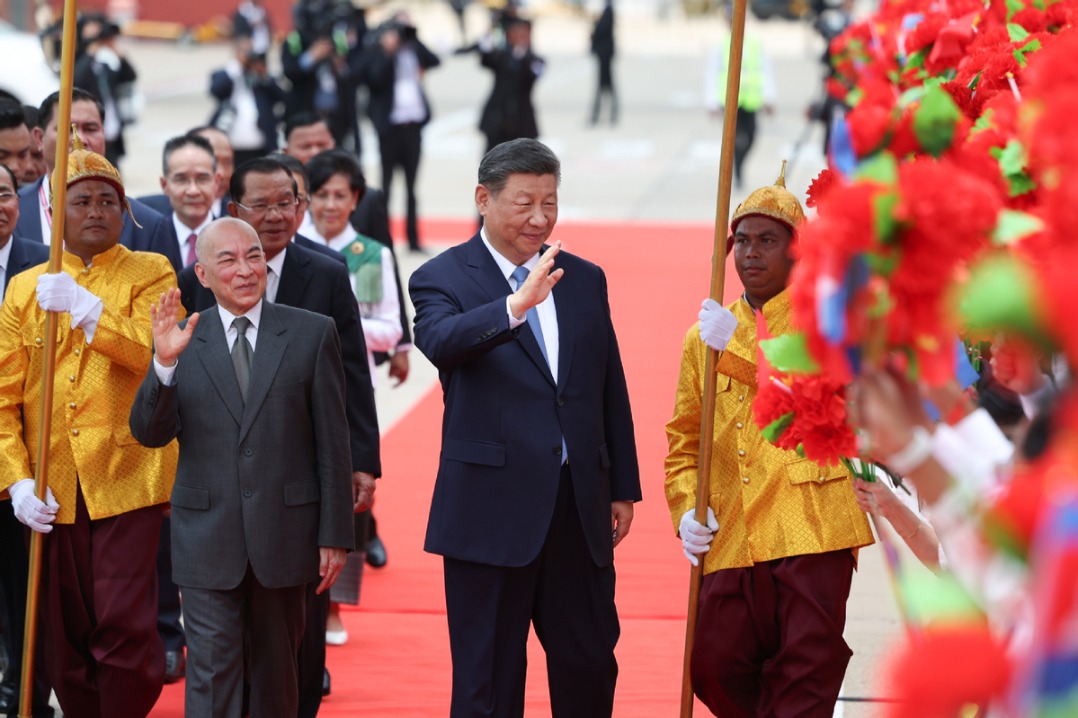Malaysia visit a defining moment in cooperation


Chinese President Xi Jinping's visit to Malaysia from Tuesday to Thursday is an opportune occasion for the two countries to advance strategic cooperation amid mounting global trade tensions and shifting economic alliances.
President Xi's visit demonstrates Beijing's commitment to deepening ties with Kuala Lumpur at a time when the global economy faces turbulence, primarily due to the United States' widening tariff regime. For Malaysia, the visit is expected to reinvigorate projects under the frameworks of the Belt and Road Initiative and the Regional Comprehensive Economic Partnership, create new opportunities in the high-tech sector, and strengthen the regional economic architecture.
China has been Malaysia's largest trading partner for years, with bilateral trade reaching record highs, while Malaysia has positioned itself as China's second-largest trading partner within ASEAN. The two sides therefore should focus on expediting infrastructure development, promoting digital innovation, and advancing green technology.
During Xi's visit, Chinese companies are expected to hold discussions on major infrastructure ventures including high-speed railways, power plants and digital connectivity, building on ongoing projects like the East Coast Rail Link and the twin industrial parks in Kuantan in Malaysia's Pahang province, and Qinzhou in China's Guangxi Zhuang autonomous region as part of "Two Countries, Twin Parks" project under the BRI.
These initiatives have boosted investments and created jobs. For instance, Alliance Steel, one of the biggest steelmakers in Malaysia and among the first companies to set up a plant in the Kuantan park, employs more than 4,000 local people.
Given that China is a global leader in electric vehicles and artificial intelligence, and Malaysia's strong foundation in electrical and electronics products, the two sides are well positioned to move from traditional trade toward co-development. For example, the EV conference in Malaysia in December showed growing Chinese interest in establishing local operations in fields such as charging stations and battery technology. In fact, Malaysia — benefiting from Chinese know-how and local experts in chips — has all the potential to become a regional EV and AI hub.
Xi's visit to three Southeast Asian countries, including Malaysia, comes at a time when US tariffs on imports from China and other countries threaten to destabilize global trade.
That the US tariffs are part of the administration's bargaining strategy is clear. It's a US strategy to put pressure on other countries, forcing them to meet the US' conditions during negotiations. In the short term, the impact of the US tariffs may be immense. But beyond that, Southeast Asia, along with China, can strike a new balance in the region, with ASEAN member states reducing their dependence on external powers, and stabilizing their relationship with China.
ASEAN member states, including Malaysia, have a young and growing population with strong purchasing power. If China's exports to the US are disrupted by tariffs, it can find in ASEAN a valuable alternative market. And since Malaysian imports from the US will become more costly, this is the right time for the country to deepen cooperation with China and work together to navigate global uncertainties.
Malaysia's role as ASEAN chair this year has boosted its diplomatic clout.
By promoting regional consensus, Malaysia can help offset the protectionist shocks while advancing shared economic interests. The changing trade landscape, ironically, creates new space for ASEAN-China collaboration to grow.
The rise of cross-border digital payments and cooperation in financial technology presents yet another frontier. Malaysia has been modernizing its financial infrastructure and is in discussions with other ASEAN members on using currencies other than the US dollar to settle trade deals. By collaborating with China — already a global leader in digital currency and mobile payments — Malaysia could strengthen its position as a fintech hub that promotes yuan-based transactions.
Malaysia offers a range of strategic advantages that make it an attractive destination for Chinese investment. The cultural ties between the two countries and the friendly relations between their governments provide a solid foundation for both people-to-people and business-to-business collaboration. Since the introduction of mutual visa-free travel last year, the number of travelers between China and Malaysia has surged, further fostering deeper cultural and economic links.
In the realm of politics, Malaysia has demonstrated remarkable stability. Despite the changes in ruling parties in recent years, the country's efficient civil service has ensured continuity in governance, providing a stable environment for business operations. Political stability, combined with Malaysia's strategic location, makes it an ideal hub for international trade.
President Xi's visit is expected to deepen mutual trust and create new development opportunities. For Malaysia, the path forward lies in leveraging this moment to complete long-term projects, attract sustainable investment, and champion regional economic resilience.
For China, it is a chance to deepen engagement with a dependable partner that can facilitate broader integration in Asia and beyond.
In times of geopolitical uncertainties, it is this kind of pragmatic, forward-looking collaboration that offers the most promising path to shared prosperity.

The author is chairman of the Malaysian Chamber of Commerce and Industry in China. The views don't necessarily reflect those of China Daily.
If you have a specific expertise, or would like to share your thought about our stories, then send us your writings at opinion@chinadaily.com.cn, and comment@chinadaily.com.cn.































